
Accountability in Education
Two Kinds of Accountability in Education
Accountability in education is a complicated thing. There are two distinct types: fiscal accountability and academic accountability. To make matters more complicated, there’s the overlap—where fiscal facts impact academic outcomes. Suffice it to say, that sorting this out in any school environment is a mess.
But let’s set aside the financial side for a moment and focus solely on academics.
Academic Accountability
When I began my teaching career, annual state testing and school grades were already part of the landscape. Beyond that, most testing was done by teachers. Gradually, districts started purchasing tools for benchmark assessments and programs to measure Lexile levels and comprehension.
We moved from a simple “pulse check” to constant testing — more and more testing. In theory, it sounds great: if I know where my students are academically, I can meet them there. But in reality, where my students were and where they needed to be were worlds apart. I had 7th graders who needed to learn about government and read the Declaration of Independence, the Constitution, and the Bill of Rights — documents that are considered post-secondary reading material. Yet, most of my students were reading at a 3rd or 4th-grade level.
I had all this data showing me how these students missed critical milestones, and naturally, I had questions. What was I supposed to do with students struggling to read the textbook, let alone primary source documents?
The response? “Don’t worry, they’re in remedial reading classes too.” Which, of course, takes away an elective and adds more academic pressure on students who are already struggling. That’s a tough blow in middle school.
Why Are So Many Middle Schoolers Struggling to Read?
More questions followed: Why do so many middle schoolers still need reading intervention? Weren’t they supposed to have mastered that by 3rd grade?
The response to any serious pushback was, “You’re not a reading teacher. Stay in your lane.” The crazy thing is, over the years, their reading didn’t improve. Then the message flipped: “We’re all reading teachers.” No matter your subject, teaching reading skills was now supposed to be part of your plan.
Here’s the rub: Everyone was teaching reading wrong. Every intervention, every extra class, every math and science teacher scrambling to incorporate reading skills — it was all wrong. The methodology was flawed from the start. I won’t go off on a dissertation-level tangent here, but if you’re interested in the details, I recommend the podcast Sold a Story. It’s a well-done, six-part series that uncovers how the entire reading enterprise stopped teaching kids to sound out words (old-school phonics) and instead used a method that showed short-term gains but left students stranded when the texts got more difficult — like in middle school when they begin reading our founding documents.
This revelation came out nearly two years ago, and many states, including West Virginia, have responded with changes. There are new laws targeting 3rd-grade reading proficiency and interventions.
But that doesn’t change the fact that millions of students, current middle and high schoolers, are still struggling.
Accountability in Home Education
On a personal note, as a home educator this year, I’ve had to take a step back with my middle schooler. I saw all the signs that he was just getting by with his reading and was about to hit a wall. Thankfully, because of school choice here in West Virginia, he can spend this year doing targeted remediation with a professional who will get him where he needs to be. Schools can’t do that. In public schools, the train leaves the station in Kindergarten and keeps moving, no matter what.
True accountability happens when there are real consequences for missing the mark. I can circle back because I’m the one accountable now. I make the decisions about how to correct this glaring mistake. Schools, however, don’t have that flexibility. They can’t be nimble when it comes to remediation.
If you suspect your child is falling behind in reading, don’t be afraid to ask questions. Talk to their teachers, ask for data, and look for any signs your child may be struggling with the basics, like sounding out words or comprehending what they read. The earlier you identify these stumbling blocks, the better. Reading is foundational to all other learning, and if something feels off, trust your instincts. Push for answers, ask what interventions are in place, and don’t settle for a one-size-fits-all approach. You are your child’s best advocate. You shouldn’t leave their reading journey to chance.








